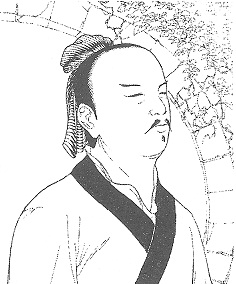|
 曾子名參,字子輿,春秋魯人。事親至孝,受業於孔門,為子思師,傳孔道為己任。一日三省而律己:「為人謀而不忠乎?與朋友交而不信乎?傳不習乎?」一日,孔子對曾子曰:「參乎!吾道一以貫之。」曾子曰:「唯。」子出之後,門人問:「何謂也?」曾子曰:「夫子之道,忠恕而已矣。」盡己為忠,忠於事;推己為恕,恕於人。著〈大學〉,提出「三綱八目」,為求學之程序。又著〈孝經〉。孔子主張:「生,事之以禮。死,葬之以禮,祭之以禮,謂之孝。」又云:「生不養,死不葬,謂之不孝。」曾子亦注重慎終追遠之倫理觀念。後人稱為宗聖。 曾子名參,字子輿,春秋魯人。事親至孝,受業於孔門,為子思師,傳孔道為己任。一日三省而律己:「為人謀而不忠乎?與朋友交而不信乎?傳不習乎?」一日,孔子對曾子曰:「參乎!吾道一以貫之。」曾子曰:「唯。」子出之後,門人問:「何謂也?」曾子曰:「夫子之道,忠恕而已矣。」盡己為忠,忠於事;推己為恕,恕於人。著〈大學〉,提出「三綱八目」,為求學之程序。又著〈孝經〉。孔子主張:「生,事之以禮。死,葬之以禮,祭之以禮,謂之孝。」又云:「生不養,死不葬,謂之不孝。」曾子亦注重慎終追遠之倫理觀念。後人稱為宗聖。
註釋:
曾子姓曾,名參,字子輿,是春秋時代魯國的人。孔子說,「參也魯。」魯,就是很老實的一個人,心是很直的。他對父母很孝順,為孔門的入室弟子,傳授孔門的心法。他為人很注重信義,所以他每一天都用三省的功夫。三省的功夫是什麼呢?
「為人謀,而不忠乎?」我替別人做事,是不是盡上我的忠心?有沒有虛偽?有沒有騙人?有沒有盡上我的責任?「與朋友交而不信乎?」要自己省察,我每天與朋友交往,有沒有欺騙的行為?「傳,不習乎?」我老師所教授的道理,我是不是能常常溫習呢?是否沒忘呢?所以曾子有「堅、誠、恆」這種思想及行為。堅,他很殷勤的堅固;誠,很篤實,很誠懇地來學習;恆,不會今天學,明天就改了,他常常是一樣的。
有一天,孔子對一些學生說:「參乎!吾道一以貫之。」我所教授你們的道理,我就用一個道理貫串一切的道理。也就是
一本散為萬殊,萬殊仍歸一本。
你能把一個道理通達無礙,一切道理也都通達無礙了。這個意思是你把一個理論明白了,就把一切地理論都明白了;你一個道理若是不明白,你一切的道理都不明白。
一個道理究竟是什麼呢?這一個道理,就是能令我們破無明、顯出法性。不過在儒教裡,還沒有公開講「破無明,顯法性」。這個語意是什麼呢?這個語意就是人沒有自私自利的心,沒有欲念;你若能沒有欲念,你的智慧就開發了,一切的問題就迎刃而解,沒有一切的障礙。所以孔子說,「參乎!吾道一以貫之。」我傳授的道理,就是以一個理論通達了,一切的理論也都會通達了。
所謂「但得本,不愁末。」你把根本的法門得到,末梢的問題都不成問題了。
待續 |
|
Text:
Zeng Zi’s formal name was Shen, styled Ziyu. He lived during the Spring and Autumn period and was a native of the state of Lu. He was very filial to his parents. As a disciple of Confucius, he was ever mindful of the Master’s teachings and took upon himself the responsibility of propagating Confucianism. Everyday, he disciplined himself with the three introspections: “Am I honest in my dealings with others? Am I a trustworthy person to my friends? Have I put into practice whatever I have learned?” One day, Confucius exclaimed to Zeng Zi, “Shen! My teachings can be summed up by one principle.” Zeng Zi agreed. After the Master had left, the other students asked, “What is the explanation for this?” Zeng Zi answered, “The Master’s teachings are all about honesty and forbearance.” Putting in one’s best effort is to be honest in one’s undertakings; giving in to others is to show forbearance. He wrote
The Great Learning in which the Three Programs and Eight Articles are advocated as a method for acquiring knowledge. He was also the author of
The Classic of Filial Piety. Confucius said, “When one’s parents are alive, serve them respectfully. When they are dead, arrange for their funerals and perform memorials in accordance with the rites. This is called filial piety.” It is also said: “If one does not care for one’s parents when they are alive or bury them when they are dead, one is considered unfilial.” He also emphasized the ethical concept of arranging for the funeral rites of one’s parents and conducting memorials for them. Later generations honored Zeng Zi as the “Ancestral Sage”.
Commentary:
Zeng Zi’s surname was Zeng. His formal name was Shen and his style name was Ziyu. He lived during the Spring and Autumn period and was a native of the state of Lu. Confucius once said, “Shen is a straightforward person.” The character
lu refers to one who is very honest and straightforward. He was very filial to his parents and he transmitted the essentials of Confucius’ teachings to the senior disciples. As he was very concerned about keeping faith with others, he cultivated the skill of three introspections everyday. What is the skill of the three introspections?
“Am I honest in my dealings with others?” When I do things for other people, have I acted in good faith? Is there any hypocrisy? Did I cheat others? Did I discharge my responsibilities properly? “Am I a trustworthy person to my friends?” One should reflect thus: “In my daily interactions with my friends, have I acted in a deceitful manner?” “Have I put into practice whatever I have learned?” As for the principles that my teacher taught me, have I been able to constantly review his lessons? Do I still remember them? That was why Zeng Zi’s thinking and behavior displayed the three qualities of steadfastness, sincerity and perseverance.
The character jian means that he was diligent and steadfast; cheng means that he was honest and sincere in learning;
heng means that he would not deviate from what he had learned and would always abide by them. One day, while addressing his students, Confucius said, “Shen! My teachings can be summed up by one principle.” The principles that Confucius taught could be summarized by one single principle. In other words: “A single origin gives rise to the myriad things; the myriad things all return to the origin.” If you are able to penetrate one principle without any obstruction, then all principles will be penetrated without obstruction. This means that by understanding one theory, all theories will be understood. If you cannot understand a single theory, then you will not understand all theories.
What is the meaning of “a single principle”? This is the principle that enables us to break through our ignorance and reveal our dharma nature. However, in Confucianism, the principle of “breaking ignorance to reveal the dharma nature” is not explicitly stated. What does this signify? It signifies that a person does not have the mind of greed and self-benefit, nor any thoughts of desire. If you are devoid of any thoughts of desire, your wisdom will manifest and all problems will be resolved easily without any obstructions whatsoever. Hence, Confucius said, “Shen! My teachings can be summed up by one principle.” The principle that I teach is such that by penetrating one theory, all theories will be penetrated.
As the saying goes: “Once the fundamentals are acquired, there is no need to worry about the incidentals.” If you are able to grasp the fundamental dharma door, superficial matters will not present any problems.
To be continued
|